Jeep Compass vs Kia Ceed Sportswagon – Differences & prices compared
Compare performance, boot space, consumption and price in one view.
Find out now: which car is the better choice for you – Jeep Compass or Kia Ceed Sportswagon?
The Jeep Compass (SUV) comes with a Petrol MHEV, Plugin Hybrid or Electric engine and Automatic transmission. In comparison, the Kia Ceed Sportswagon (Estate) features a Petrol or Petrol MHEV engine with Automatic or Manuel transmission.
When it comes to boot capacity, the Jeep Compass offers 550 L, while the Kia Ceed Sportswagon provides 625 L – depending on how much space you need. If you’re looking for more power, decide whether the 240 HP of the Jeep Compass or the 140 HP of the Kia Ceed Sportswagon suits your needs better.
In terms of consumption, the values are 17.50 kWh2 L per 100 km for the Jeep Compass, and 6 L for the Kia Ceed Sportswagon.
Price-wise, the Jeep Compass starts at 34200 £, while the Kia Ceed Sportswagon is available from 24300 £. Compare all the details and find out which model fits your lifestyle best!
Jeep Compass
The Jeep Compass combines a rugged aesthetic with modern sophistication, making it a standout choice in the compact SUV segment. Its robust design is complemented by a comfortable interior that offers ample space and cutting-edge technology for a seamless driving experience. Whether tackling urban environments or venturing off-road, the Compass provides versatility and reliability, embodying the adventurous spirit synonymous with the Jeep brand.
details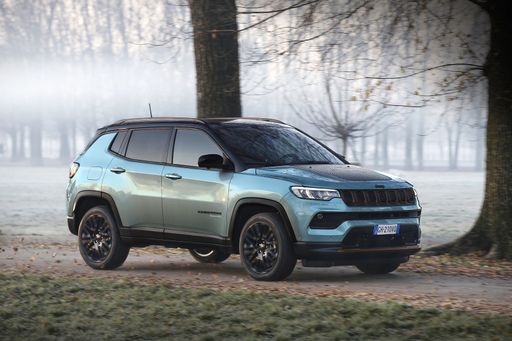 @ media.stellantis.com
@ media.stellantis.com
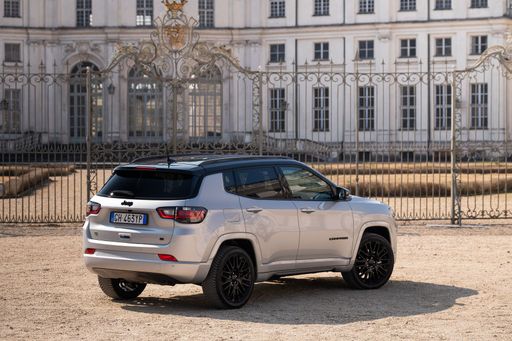 @ media.stellantis.com
@ media.stellantis.com
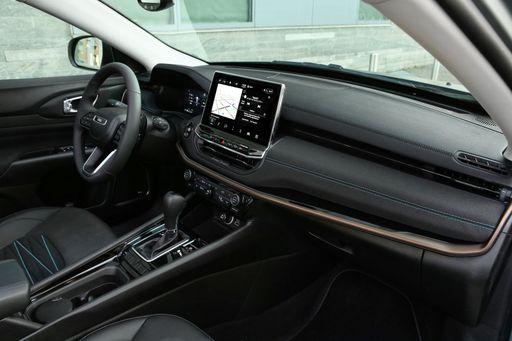 @ media.stellantis.com
@ media.stellantis.com
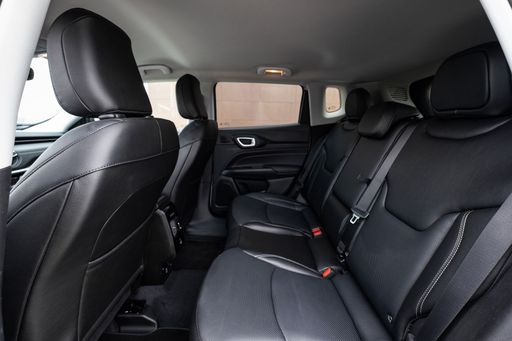 @ media.stellantis.com
@ media.stellantis.com
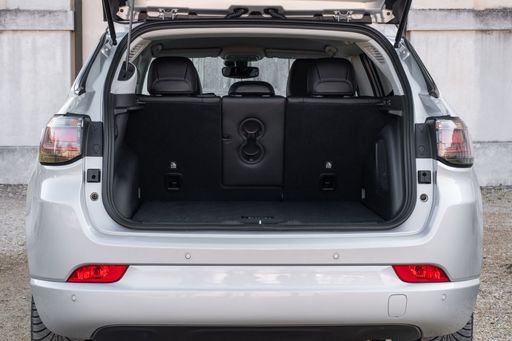 @ media.stellantis.com
@ media.stellantis.com
Kia Ceed Sportswagon
The Kia Ceed Sportswagon is a versatile estate car that combines practicality with a touch of elegance. It offers a spacious interior, making it ideal for families or those with an active lifestyle. The vehicle's sleek design and advanced features make it a strong contender in the competitive estate car market.
details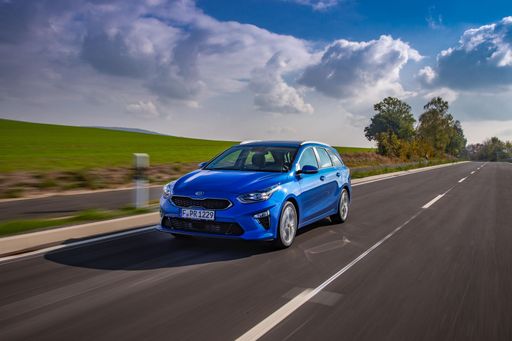 @ press.kia.com
@ press.kia.com
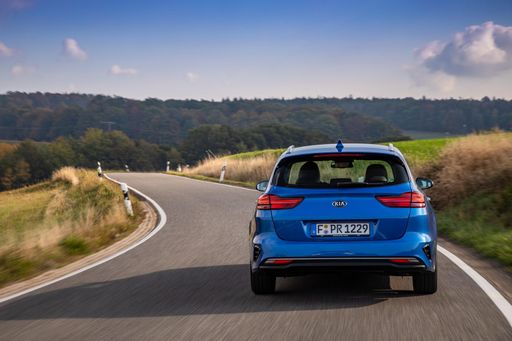 @ press.kia.com
@ press.kia.com
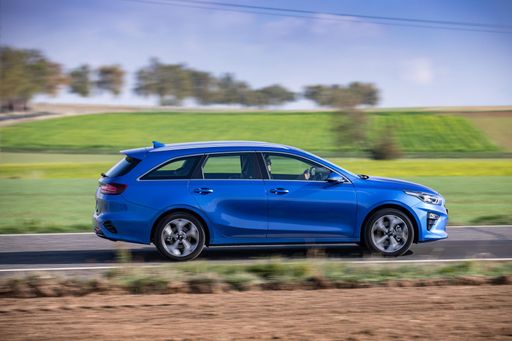 @ press.kia.com
@ press.kia.com
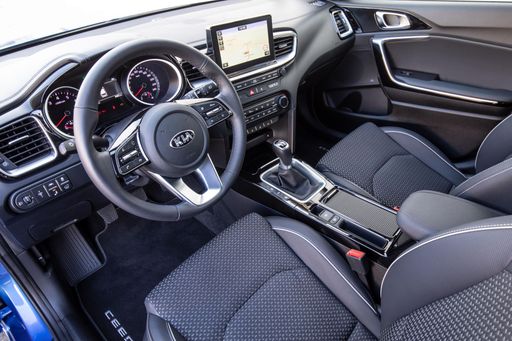 @ press.kia.com
@ press.kia.com
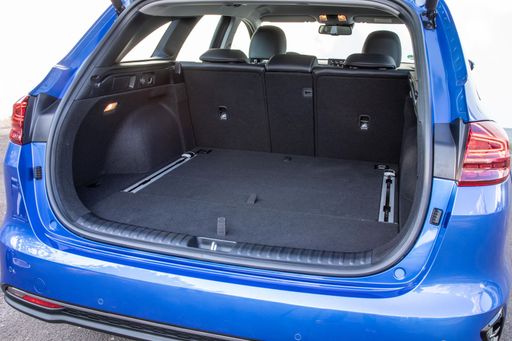 @ press.kia.com
@ press.kia.com

|

|
|
|
|
Costs and Consumption |
|
|---|---|
|
Price
34200 - 46900 £
|
Price
24300 - 29100 £
|
|
Consumption L/100km
2 - 5.9 L
|
Consumption L/100km
6 - 6.4 L
|
|
Consumption kWh/100km
17.50 kWh
|
Consumption kWh/100km
-
|
|
Electric Range
36 - 500 km
|
Electric Range
-
|
|
Battery Capacity
74 kWh
|
Battery Capacity
-
|
|
co2
0 - 133 g/km
|
co2
137 - 146 g/km
|
|
Fuel tank capacity
36 - 55 L
|
Fuel tank capacity
50 L
|
Dimensions and Body |
|
|---|---|
|
Body Type
SUV
|
Body Type
Estate
|
|
Seats
5
|
Seats
5
|
|
Doors
5
|
Doors
5
|
|
Curb weight
1575 - 2198 kg
|
Curb weight
1335 - 1437 kg
|
|
Trunk capacity
420 - 550 L
|
Trunk capacity
512 - 625 L
|
|
Length
4404 - 4552 mm
|
Length
4605 mm
|
|
Width
1819 mm
|
Width
1800 mm
|
|
Height
1629 - 1675 mm
|
Height
1422 - 1465 mm
|
|
Payload
465 - 470 kg
|
Payload
455 - 485 kg
|
Engine and Performance |
|
|---|---|
|
Engine Type
Petrol MHEV, Plugin Hybrid, Electric
|
Engine Type
Petrol, Petrol MHEV
|
|
Transmission
Automatic
|
Transmission
Automatic, Manuel
|
|
Transmission Detail
Dual-Clutch Automatic, Automatic Gearbox, Reduction Gearbox
|
Transmission Detail
Dual-Clutch Automatic, Manual Gearbox
|
|
Drive Type
Front-Wheel Drive, All-Wheel Drive
|
Drive Type
Front-Wheel Drive
|
|
Power HP
130 - 240 HP
|
Power HP
100 - 140 HP
|
|
Acceleration 0-100km/h
7.3 - 10.3 s
|
Acceleration 0-100km/h
9.7 - 13.5 s
|
|
Max Speed
180 - 200 km/h
|
Max Speed
178 - 197 km/h
|
|
Torque
230 - 345 Nm
|
Torque
172 - 253 Nm
|
|
Number of Cylinders
4
|
Number of Cylinders
3 - 4
|
|
Power kW
96 - 177 kW
|
Power kW
74 - 103 kW
|
|
Engine capacity
1199 - 1469 cm3
|
Engine capacity
998 - 1482 cm3
|
General |
|
|---|---|
|
Model Year
2024 - 2025
|
Model Year
2024
|
|
CO2 Efficiency Class
D, B, A
|
CO2 Efficiency Class
E
|
|
Brand
Jeep
|
Brand
Kia
|
Jeep Compass
Exploring the Jeep Compass: A Modern SUV with Innovative Features
The Jeep Compass continues to challenge the boundaries of what an SUV can be, offering a blend of practicality, efficiency, and rugged appeal. This model, distinguished by its diverse range of powertrains, promises to cater to various needs and preferences. From urban commuting to exploring off-road trails, the Compass delivers with aplomb.
Engine Versatility and Performance
Under the bonnet, the Jeep Compass offers a diverse lineup of engines designed to meet varying driver demands. With options ranging from mild hybrid petrol engines to advanced Plug-in Hybrid Electric Vehicles (PHEVs), the Compass provides both efficiency and power. This impressive engine choice results in power outputs from 130 to 240 PS, ensuring that there is a model suitable for both city driving and more ambitious off-road excursions.
Performance devotees will appreciate the Compass's quick acceleration, clocking 0-100 km/h in as little as 7.3 seconds. Meanwhile, fuel economy remains commendable, with consumption figures between 1.7 to 5.5 litres per 100 kilometres, making the Compass an economical choice for daily driving.
Innovative Hybrid Technology
The Jeep Compass brings cutting-edge hybrid technology to the forefront. The available plug-in hybrid variants offer electric-only driving ranges of up to 53 kilometres, ideal for environmentally conscious urban drivers. This zero-emission capability makes short trips sustainable without compromising on the flexibility offered by the internal combustion engine for longer journeys.
Dynamic Drivetrain Options
One of the main talking points of the Compass is its adaptable drivetrain options, which include both front-wheel drive and all-wheel drive systems. The 4xe PHEV models particularly stand out with their all-wheel drive, providing enhanced stability and traction suitable for varying terrains. Additionally, the automated transmission ensures smooth gear changes and an overall comfortable driving experience.
Design and Comfort
Beyond performance, the Jeep Compass excels in providing a stylish and functional environment. The SUV's dimensions, ranging between 4398 to 4404 mm in length and up to 1874 mm in width, offer ample interior space for both passengers and cargo. The boot space varies from 420 to 438 litres, accommodating the needs of families and adventure-seekers alike.
With seating for five, maximum comfort is assured, thanks to high-quality materials and thoughtfully designed interiors. The Compass integrates advanced technology seamlessly into its cabin, ensuring easy connectivity and an engaging driving experience.
Safety and Efficiency
Safety is paramount in the Jeep Compass, with a range of driver assistance features providing peace of mind. The model adheres to impressive CO2 efficiency standards, boasting a CO2 emission range between 37 and 123 g/km, making it both a responsible and reliable choice.
Furthermore, the Compass offers competitive running costs, with monthly expenses ranging from €1,095 to €1,315, and an average cost per kilometre between 43.8 and 52.6 cents. This cost-effectiveness further underscores the Compass’s value proposition.
Conclusion
Overall, the Jeep Compass stands out as a richly equipped, versatile SUV, ready to tackle urban or off-road challenges. With its blend of powertrain innovations, superior performance, and sophisticated design, it redefines what’s possible in the SUV segment. Whether for efficient city driving or adventurous journeys into the unknown, the Compass is ready to rise to the occasion.
Kia Ceed Sportswagon
Introducing the Kia Ceed Sportswagon: A Blend of Style and Functionality
The Kia Ceed Sportswagon has entrenched itself as a preferred choice for families and individuals alike, merging dynamic styling with an impressive suite of functionalities. Embodying the attributes of a classic estate car, it offers ample space without compromising on elegance or driving performance.
Innovative Powertrains: Bridging Performance and Efficiency
The Ceed Sportswagon comes equipped with a range of powertrains designed to meet varying customer needs. From traditional petrol options to innovative mild-hybrid and plug-in hybrid systems, the range is catered to deliver on efficiency and power. The plug-in hybrid variant, especially, stands out with its ability to travel up to 50 km purely on electric power, and a remarkable combined fuel consumption of 1.3 L/100 km.
Performance Specifications: Power Meets Precision
Depending on the choice of engine, drivers can experience power outputs ranging from 100 to 141 PS, complemented by torque values between 172 and 265 Nm. Acceleration capabilities vary, with 0-100 km/h achieved in times ranging from 9.7 to 13.5 seconds, providing a performance spectrum to cater to different needs, be it efficiency or spirited driving.
State-of-the-Art Technology and Safety
Kia has packed the Ceed Sportswagon with an array of technological innovations aimed at improving safety and driving experience. From advanced driver-assistance systems to connectivity solutions, the car ensures both the driver and passengers stay safe, informed, and entertained throughout their journey.
Design and Comfort: A Space That Inspires
Aesthetically, the Ceed Sportswagon is both modern and sleek, with a length of up to 4605 mm and a height of up to 1465 mm ensuring a spacious interior. The boot space offers between 437 and 625 litres, catering not only to daily errands but also to road trips. Inside, the seating configuration comfortably accommodates five passengers, making it ideal for families and groups.
Economic Offering: Value for Money
With prices ranging from €26,590 to €42,080, the Ceed Sportswagon presents itself as an economically compelling option without skimping on quality or features. Furthermore, with different equipment lines available, from the elegant Vision to the sport-oriented GT Line, buyers have the flexibility to choose a model that aligns with their lifestyle and preferences.
In Summary: The Complete Package
The Kia Ceed Sportswagon is a testament to Kia's commitment to innovation, quality, and design. Perfectly balancing practicality and performance, it remains a formidable contender in the estate segment, appealing to those who seek a versatile vehicle capable of addressing a multitude of daily driving needs with flair and reliability.
Which drive types are available for the Jeep Compass?
Available as Front-Wheel Drive or All-Wheel Drive.
The prices and data displayed are estimates based on German list prices and may vary by country. This information is not legally binding.
